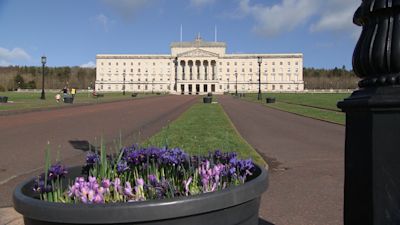Northern Ireland centenary to be quietly marked

The day that many consider to be the date the state of Northern Ireland was created will be quietly marked on Monday.
Much like the day that Northern Ireland was founded 100 years ago, there will be no huge celebrations or grand ceremonies.
Very few people who were alive to witness the birthdate of Northern Ireland were aware it was a particularly significant day.
Northern Ireland was created on 3 May 1921, when the Government of Ireland Act came into effect and partitioned the island of Ireland into two separate entities.
But the exact date of when Northern Ireland was created has divided opinion.
The effect of the Government of Ireland Act split the 32 counties of Ireland into two, leaving Antrim, Armagh, Derry, Down, Fermanagh and Tyrone to form Northern Ireland.
Whether one marks, acknowledges, remembers, celebrates or boycotts the centenary, Northern Ireland has had a turbulent history from which no single narrative can be drawn.
Nationalists and unionists hold sharply differing views on the history of Northern Ireland, on its past governance and public representation.
There are different views on the security situation including decades of conflict, seismic events like the Second World War or the civil rights movement and issues including public housing, freedom to demonstrate and equal voter representation.
Centenary commemorations, however, have not escaped the effects of Covid-19 restrictions.
On Tuesday, a panel will examine the history of Northern Ireland.
The talk, involving a number of historians brought together to advise the Government on the centenary, will take place on Tuesday live from the Ulster Museum.
Dr Caoimhe Nic Dhaibheid, a senior lecturer in modern history at the University of Sheffield, will be among the panellists.
Dr Nic Dhaibheid's work focuses on the Irish revolution and political violence.
The panel includes a number of historians from different institutions and from a variety of political backgrounds.
Dr Nic Dhaibheid said: "The panel recognises that people have very different views on the centenary and we are not seeking to impose any particular narrative.
"We want to allow for the space for multiple interpretations to come to the fore and for people to engage with the history of Northern Ireland and partition in whatever way they chose to do so.
"It's a complex and messy history."
She added: "In some respects that date becomes clearer in retrospect as time goes on.
"The people who were alive on May 3 1921 were not necessarily conscious that this was the date that was going to be identified, because that was the date in which the Government of Ireland Act came into force.
"It passed through Westminster in December 1920, it received Royal assent, but it came into legal force on May 3 1921.
"Shortly after that the write was moved to hold elections, and that then elected the first parliament which was opened in June 1921.
"I suppose because it was the date in which the Act came into force, that's why we opted for that date.
"I would also emphasise, though, that Northern Ireland's future was quite uncertain in the early years of its existence."
She added: "There will be other important centenaries coming up as well, including the centenary of the King's speech when he opened the Northern Ireland Parliament in June 9 1921."
The Government's plans to mark the centenary of the state's foundation include a major business showcase in London, a £1 million Shared History Fund, a futuristic programme for young people, tree-planting projects, academic and historic events and an international church service for all denominations.
A total of £1 million has been awarded to 39 community projects to research and demonstrate what 100 years of Northern Ireland has meant to them and their community.
Belfast City Council will host an event at the City Hall marking the 100th anniversary of the opening of the Northern Ireland Parliament in the building on 22 June 1921, by King George V.
Every school will be presented with a native tree to plant in their grounds while an extensive young people's programme will explore what the future will look like in the next 100 years.
The Centenary Rose, a flower the Government said would represent reflection and hope, will be produced in Northern Ireland and planted in the gardens of the royal residence at Hillsborough Castle in Co Down.
A Centenary Rose will also be presented to the Queen for her own garden and there will be a decorative rose pin designed and produced in the UK, to be worn by VIPs at centenary events and given to programme participants.